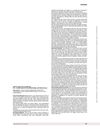 January 2020 in “Acta Scientiae Veterinariae”
January 2020 in “Acta Scientiae Veterinariae” A dog's chronic bite wound healed successfully using a mix of herbal gel, low power laser, and ozone therapy.

Patients on long-term hemodialysis often experience severe itching and various skin and nail problems.
19 citations,
March 1999 in “PubMed” Trichotillomania is a chronic condition where people uncontrollably pull out their hair, often starting in childhood.
11 citations,
August 1948 in “Journal of Investigative Dermatology” Calcium pantothenate therapy improved symptoms of discoid lupus erythematosus without side effects.
 1 citations,
September 2022 in “Rheumatology Advances in Practice”
1 citations,
September 2022 in “Rheumatology Advances in Practice” Costovertebral arthritis can cause chronic back pain in SLE patients and needs thorough evaluation.
59 citations,
October 2016 in “Clinics in dermatology” Precise skin sampling is crucial to understand the role of P. acnes in acne.
13 citations,
March 2014 in “Journal of the American Medical Directors Association” Trichotillomania was successfully treated with risperidone and naltrexone.
 December 2024 in “Frontiers in Pediatrics”
December 2024 in “Frontiers in Pediatrics” Baricitinib improved platelet counts and alopecia in a 16-year-old with chronic immune thrombocytopenia.
37 citations,
August 2009 in “Journal of the American Academy of Child & Adolescent Psychiatry” Trichotillomania is a chronic hair-pulling disorder that starts in early teens and causes distress and hair loss.
5 citations,
January 2021 in “Frontiers in Cell and Developmental Biology” Inhibiting Zyxin may help treat androgenetic alopecia by promoting hair growth.
February 2024 in “Deleted Journal” Cabergoline effectively treated a dog's hyperadrenocorticism.
 27 citations,
April 2005 in “Journal of Chemotherapy”
27 citations,
April 2005 in “Journal of Chemotherapy” Some patients may experience temporary total hair loss from hepatitis C treatment with PEG-interferon and ribavirin.
June 2020 in “Journal of skin and stem cell” The patient's hair loss from alopecia totalis returned despite initial successful treatment.
19 citations,
July 2004 in “Clinical and experimental dermatology” Acneiform follicular mucinosis can be controlled with systemic corticosteroids.
 1 citations,
November 2023 in “Brain and behavior”
1 citations,
November 2023 in “Brain and behavior” Spironolactone improved cognitive performance and early sleep quality but not manic symptoms, appetite, or body weight in bipolar disorder when added to sodium valproate.
 December 2022 in “Rossijskij žurnal kožnyh i veneričeskih boleznej”
December 2022 in “Rossijskij žurnal kožnyh i veneričeskih boleznej” New treatments for child hair loss due to immune issues are effective but not yet officially approved.
 53 citations,
January 2014 in “Journal of Cutaneous and Aesthetic Surgery”
53 citations,
January 2014 in “Journal of Cutaneous and Aesthetic Surgery” Microneedling combined with triamcinolone can safely stimulate faster hair regrowth in people with Alopecia Areata.
 1 citations,
April 2024 in “Journal of Autoimmunity”
1 citations,
April 2024 in “Journal of Autoimmunity” Interleukin-15 can help hair growth and protect hair follicles.
11 citations,
December 2013 in “International Journal of Dermatology” IL16 gene variations may affect the risk of alopecia areata in Koreans.
 January 2025 in “Biomedical Reports”
January 2025 in “Biomedical Reports” Telitacicept helped stabilize complement levels in a patient with lupus and thyroid cancer.
2 citations,
September 2011 in “Cochrane Database of Systematic Reviews” 44 citations,
March 1947 in “Endocrinology” Thiourea compounds affect hair growth and pigmentation in black rats.
 January 2024 in “JAAD case reports”
January 2024 in “JAAD case reports” Netherton syndrome can cause severe and chronic vulvovaginal symptoms that may improve with continuous oral contraceptives.
 12 citations,
May 2017 in “Medicine”
12 citations,
May 2017 in “Medicine” Oral isotretinoin was recommended for a 21-year-old woman with severe acne.
 October 2024 in “Reumatizam”
October 2024 in “Reumatizam” New treatments and understanding of skin lupus are emerging in 2024.
 1 citations,
April 2023 in “Journal of the Hellenic Veterinary Medical Society”
1 citations,
April 2023 in “Journal of the Hellenic Veterinary Medical Society” Most dogs with paw inflammation had chronic issues, often due to allergies, and certain breeds were more affected.
 July 2023 in “Australasian Journal of Dermatology”
July 2023 in “Australasian Journal of Dermatology” The analysis found that alopecia areata, a hair loss condition, is not very common in Australia, affecting about 0.13% of people, with new cases most often seen in males aged 19 to 34 years.
 1 citations,
June 2023 in “Genes”
1 citations,
June 2023 in “Genes” Hair loss from Alopecia Areata is caused by both genes and environment, with several treatments available but challenges in cost and relapse remain.
 September 2023 in “Drugs in context”
September 2023 in “Drugs in context” Baricitinib is a promising treatment for alopecia areata.

















